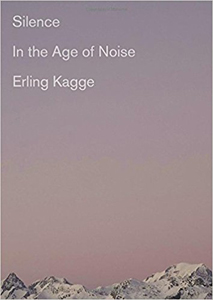 Erling Kagge, translated from the Norwegian by Becky L. Crook, Silence in the Age of Noise (New York: Pantheon, 2017), 145pp.
Erling Kagge, translated from the Norwegian by Becky L. Crook, Silence in the Age of Noise (New York: Pantheon, 2017), 145pp.
The novelist David Foster Wallace once characterized our culture as one of Total Noise. In this little meditative manifesto, the Norwegian Erling Kagge pushes back against our noisy status quo. In his view, we humans have a profound and primal need for silence. Call it what you will—stillness, mindfulness, being present, inner peace, or childlike wonder, silence is essential for sanity in our modern world. In these thirty-three short reflections, each of which is just a couple pages, Kagge explores the silence around us (external) and the silence within us (internal).
Kagge brings an unusual personal story to these reflections. Most people know him as a world class explorer. He was the first person to walk alone to the South Pole, and the first person to complete the so-called "Three Poles Challenge" — the North Pole, the South Pole, and Mt. Everest. During his Antarctic expedition, for example, he had zero radio contact and didn't speak to another person for fifty days. In addition to these personal experiences, Kagge draws upon his urban life in Oslo, his publishing business that he started, his art collecting, scientific studies, and simple things like dinner conversations with his girls. Along the way he reflects on philosophers like Kierkegaard and Heidegger, poets like Blake and Emily Dickinson, the musicians John Cage and Beethoven, and the Roman Stoic and statesman Seneca.
Christians have their own traditions of silence, of course: "Be still and know that I am God." One thinks of the Trappist monks who take a vow of silence, or the Eastern Orthodox mystical tradition of contemplative prayer called hesychism ("stillness"). In one of his better sound bites, Kagge appeals to the French polymath Pascal: "All of humanity's problems stem from man's inability to sit quietly in a room alone." Indeed.


